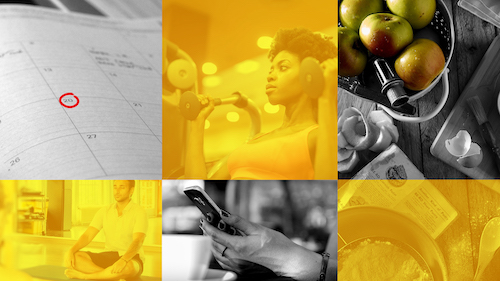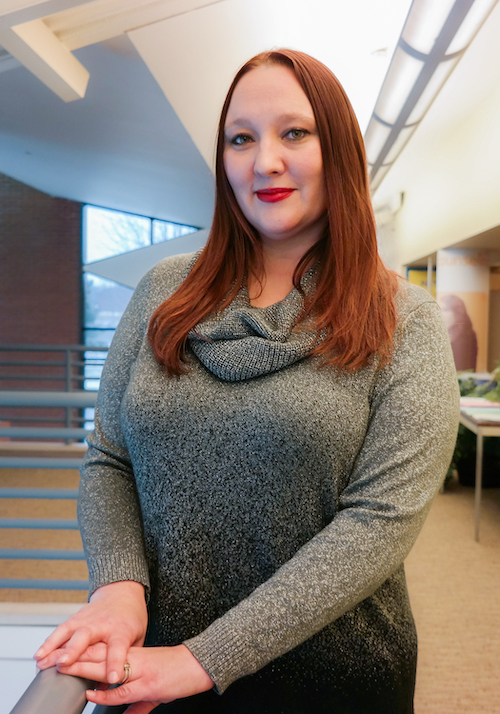Reporter: And of course the tricky thing is a lot of options are simply off the table because of the shelter-in-place order. So what tops your list of things people should think about doing to build up those routines?
Sara: Several things come to mind. For starters, cast your time in the kitchen in a new light. For many of us, cooking at the end of a long work day can feel like a chore. Now, you can turn it into a highlight of your day. Be creative. Last week, we dug okra out of the back of our freezer, and I’d never had okra before but it was really good. Cooking is also something you can do with the other people in your house. Or if you live alone, call up a friend while you’re cooking and cook together.
Exercise is another big one to add to your routine, and it has huge benefits for your mental health. At least for now, you can still get outside; and I swear, I’ve never seen so many people in my neighborhood out walking. Of course, you want to maintain the proper social distancing, but getting outside will also get you some sun — and that Vitamin D, which helps with your mood. Even if you’re nervous about going outside, or don’t have a good outdoor space, just opening a window and letting in some fresh air can have an impact on your state of mind. Personally, the first thing I noticed when I started working from home is that suddenly I had windows I could open, and it’s been huge for me.
Another thing I’d recommend people trying is scheduling at least one self-care thing every day. And I mean literally put it on the calendar. This is something we tell clients even under more typical circumstances. There is something about scheduling it that reinforces your commitment to actually doing an activity. And it can be anything that makes you feel happy or relaxes you in some way. For me, one of the big things has been all these online performances. I swear I’ve probably “been to” more concerts online in the past two weeks than I have in a couple of years.
Reporter: You mentioned a few ways people are recreating social experiences online. But there’s a darker side to this screen time thing, right? Like, there is a danger in just filling up your day with more computer or phone time, especially when the news is what it is.
Sara: Absolutely, and I’m so glad you brought that up. In fact, one of the really practical things we’re recommending to people right now is turning off their news notifications. It’s not that we don't want people to be informed, but you can definitely be overinformed. So check maybe twice a day for a predetermined amount of time, and try to limit it to that. It’s just too easy right now to fall down that rabbit hole of reading about all the different things that are happening, then getting on social media, then reading what people are saying there, and the next thing you know it’s been two hours. That is not healthy for anyone. Especially right now, when it’s so hard to know what we don't know, it’s easier to get confused about what’s good information. So I recommend not only limiting your time, but being extra conscious about where you're getting your news. What your best friend’s sister’s cousin heard through the grapevine is not as trustworthy as a reputable news site or government site that’s posting critical information.
Reporter: On the flip side, the technology can be a way of staying in touch with people. In fact, this may be one of the ways in which our lives are disrupted the least.
Sara: I agree completely. Right now we’re told we can’t physically hang out with friends and family, so of course, that's suddenly all we want to do, right? But if you think about it, a lot of our social connections already were through text messaging or Facetime. So it’s about doing what we already were doing to check in on each other, and then finding new ways that feel meaningful. I tried Netflix Party, where you watch the same movie with your friends and chat about it, and it was actually pretty fun. I heard about a family where the grandparents wanted to see the grandkids, so they met at a grocery store parking lot, parked next to each other, and then talked on the phone with the windows rolled up. I’ve heard of these “honking parties,” where friends will drive by a person’s house for their birthday, honking their car horns to wish them a happy birthday. So people are doing what they have to do to maintain those social connections, which plays a huge role in our mental health.
Reporter: We’ve talked about things you can do to stay positive, but the situation is, in fact, pretty scary. What’s the approach if you’re feeling a lot of anxiety about what’s going on?
Sara: A couple things come to mind. First, anxiety is a completely normal emotion. It doesn’t feel good, but I think it’s completely understandable that people would feel this way during a global pandemic. So first, you have to acknowledge it, and then commit not to drowning in it so you can move forward and experience other emotions. That’s where all the coping skills we’ve talked about can really help.
The other emotion I think that’s useful to talk about in this context is grief. I think there is a real sense of grief in losing our sense of what’s normal and parts of our lives that make us feel normal. I think that also explains why some people seem like they’re still in denial about the situation, and even why they’re angry. I have a family member, where the grief model has really helped me understand their reaction. And that’s helped me respond to them from a place of love and understanding rather than frustration.
Reporter: Sara, we really appreciate all these insights — especially because it’s above and beyond your own daily routine of helping students. Before we let you go, tell us how you’ve adjusted your office’s services for students.
Sara: For starters, we’re still operating our crisis line, and we’re still open for new clients who want therapy. If a person is interested in talking with a counselor, they can just email us. For now, the sessions are done by video and our server is a secure, HIPAA-compliant server, so it’s completely confidential. As many people know, we have an amazing peer counseling program at UM-Dearborn, and we’re figuring out right now what we can do to add some peer support online. Last week, we started daily workshops where you can listen to a therapist talking about different topics, and those are open to anyone, not just students. And finally, on our website, we’re maintaining a list of online resources anyone can use, from where to find free yoga classes to mindfulness and meditation exercises. One of the amazing things we’re seeing is that counseling directors across the country are sharing ideas with each other. So I’m making it a part of my own new routine to update that list every Friday. So check back often.
###
Find the complete list of resources from UM-Dearborn’s Counseling and Psychological Services (CAPS) on their website.






